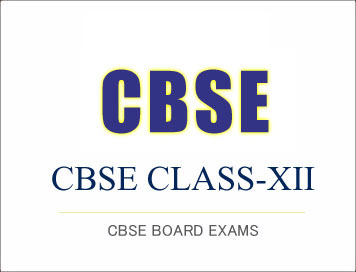CBSE Class-12 Syllabus 2018-19 (Chemistry)
Disclaimer: This website is NOT associated with CBSE, for official website of CBSE visit - www.cbse.gov.in
CBSE Class-12 Syllabus 2018-19 (Chemistry)
Rationale
Higher Secondary is the most crucial stage of school education because at this juncture specialized discipline based, content -oriented courses are introduced. Students reach this stage after 10 years of general education and opt for Chemistry with a purpose of pursuing their career in basic sciences or professional courses like medicine, engineering, technology and other applied areas. Therefore, there is a need to provide learners with sufficient conceptual background of Chemistry, which will make them competent to meet the challenges of academic and professional courses after the senior secondary stage.
The new and updated curriculum is based on disciplinary approach with rigour and depth taking care that the syllabus is not heavy and at the same time it is comparable to the international level. The knowledge related to the subject of Chemistry has undergone tremendous changes during the past one decade. Many new areas like synthetic materials, bio -molecules, natural resources, industrial chemistry are coming in a big way and deserve to be an integral part of chemistry syllabus at senior secondary stage. At international level, new formulations and nomenclature of elements and compounds, symbols and units of physical quantities floated by scientific bodies like IUPAC and CGPM are of immense importance and need to be incorporated in the updated syllabus. The revised syllabus takes care of all these aspects. Greater emphasis has been laid on use of new nomenclature, symbols and formulations, teaching of fundamental concepts, application of concepts in chemistry to industry/ technology, logical sequencing of units, removal of obsolete content and repetition, etc.
Objectives
The curriculum of Chemistry at Senior Secondary Stage aims to:
• promote understanding of basic facts and concepts in chemistry while retaining the excitement of chemistry.
• make students capable of studying chemistry in academic and professional courses (such as medicine, engineering, technology) at tertiary level.
• expose the students to various emerging new areas of chemistry and apprise them with their relevance in future studies and their application in various spheres of chemical sciences and technology.
• equip students to face various challenges related to health, nutrition, environment, population, weather, industries and agriculture.
• develop problem solving skills in students.
• expose the students to different processes used in industries and their technological applications.
• apprise students with interface of chemistry with other disciplines of science such as physics, biology, geology, engineering etc.
• acquaint students with different aspects of chemistry used in daily life.
• develop an interest in students to study chemistry as a discipline.
• integrate life skills and values in the context of chemistry.
CLASS XII (2018-19)
THEORY
Total Periods (Theory 160 + Practical 60)
Time: 3 Hours
70 Marks
|
Unit No. |
Title |
No. of Periods |
Marks |
|
Unit I |
Solid State |
10 |
23 |
|
Unit II |
Solutions |
10 |
|
|
Unit III |
Electrochemistry |
12 |
|
|
Unit IV |
Chemical Kinetics |
10 |
|
|
Unit V |
Surface Chemistry |
08 |
|
|
Unit VI |
General Principles and Processes of Isolation of Elements |
08 |
19 |
|
Unit VII |
p-Block Elements |
12 |
|
|
Unit VIII |
d -and f -Block Elements |
12 |
|
|
Unit IX |
Coordination Compounds |
12 |
|
|
Unit X |
Haloalkanes and Haloarenes |
10 |
28 |
|
Unit XI |
Alcohols, Phenols and Ethers |
10 |
|
|
Unit XII |
Aldehydes, Ketones and Carboxylic Acids |
10 |
|
|
Unit XIII |
Organic Compounds containing Nitrogen |
10 |
|
|
Unit XIV |
Biomolecules |
12 |
|
|
Unit XV |
Polymers |
08 |
|
|
Unit XVI |
Chemistry in Everyday Life |
06 |
|
|
|
Total |
160 |
70 |
Click Here To Download Full Syllabus
Courtesy: CBSE
